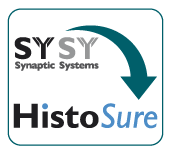|
|
|
|
| Cat. No. HS-361 017 |
200 µl purified IgG, lyophilized. Albumin and azide were added for stabilization. For reconstitution add 200 µl H2O. Then aliquot and store at -20°C to -80°C until use. Antibodies should be stored at +4°C when still lyophilized. Do not freeze! |
| Applications | |
| Clone | GHH8/321E9 |
| Subtype | IgG2a |
| Immunogen | Synthetic peptide corresponding to AA 230 to 247 from mouse CD8a (UniProt Id: P01731) |
| Reactivity |
Reacts with: mouse (P01731). No signal: human, rat. Other species not tested yet. |
| Remarks |
IHC-Fr: 4% formaldehyde/PFA fixation is recommended. |
| Data sheet | Datasheet hs-361_017 |
 Important information
Important information|
|
CD 8 is a heterodimeric T-cell surface glycoprotein that consists of a CD 8a (alpha) and beta chain. It identifies cytotoxic/suppressor T-cells that interact with MHC class I bearing targets. CD 8 is thought to play a role in the process of T-cell mediated killing. CD 8 alpha chains binds to class I MHC molecules alpha-3 domains.